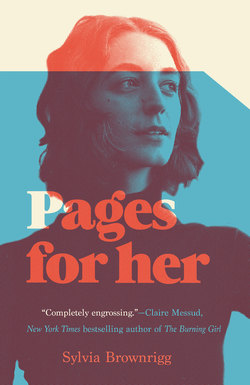Читать книгу Pages For Her - Sylvia Brownrigg - Страница 28
На сайте Литреса книга снята с продажи.
20
ОглавлениеFlannery’s mother came frequently, of course, driving up from her modest home on the Peninsula. Charles’s mother had died of lung cancer several years before he and Flannery met, and he was in scarce contact with his father in Ohio, so Willa was a girl with a single present grandparent.
Now in her sixties, unmarried, a few years away from retiring from the high school, Laura Jansen’s face gently sagged but was still pretty, her weathered skin creased mostly by kindness, her undyed hair the shade of sandy driftwood, streaked off-white with the tracings of sea creatures, or years. Laura was perplexed by but tolerant of her daughter’s shifting choices, and had a formal respect for the man Flannery had married, without necessarily understanding either his work or his attraction. She had never been a baby person, Flannery recalled noticing at a family gathering after Rachel’s child was born, but Laura was interested in people and their stories, and as her granddaughter grew older, she happily read picture books to her, listened to the girl’s tales and opinions, and wandered hand in hand with her to story hour at the local library.
For the moment, Laura nestled Willa gingerly until she started crying, then handed her back with visible relief. Charles, trying perhaps to establish his paternal standing with his mother-in-law, took Willa and walked with her, rocking her. This did not happen altogether often, Flannery quietly knew, but she saw her mother registering Charles’s thick, loving arms holding the tiny girl. A complex cloud moved over her mother’s face that had in it memory and wistfulness, both.
‘I’ve told you about the trip I took with you to Italy, haven’t I?’ Laura said to Flannery, though the question was really aimed at Charles.
‘Tell it again,’ her daughter said.
‘Well. You were ten months old, and a girlfriend of mine was living for a term in Florence.’ That Don Lennart, as Flannery ironically named him, had deserted Laura shortly before Flannery was born was a fact the single mother skipped over. ‘Jennifer said I had to come visit, though I’m not sure her husband was completely thrilled to have a baby wailing in their tiny apartment. You were quite a loud little thing!’ Laura watched Charles holding Willa, whose cries had turned to hiccups and were subsiding. The part of this story Flannery had always least enjoyed was how piercing her own scream had been as an infant. It was a bit late to apologize for it now.
‘I’ll never forget,’ her mother laughed ruefully, ‘taking the train from Florence to Rome. I realized I needed to give Jennifer and David a break so I thought I could manage an overnight in Rome, alone. With you.’ Laura winced at her own naive determination. She had been brave then. In 1975. ‘But I had left the bag of diapers on the train, when I got off. So there I was in the Rome train station, your lovely yellow onesie was soiled and you were crying, and I sat on a bench trying to clean you up – to fashion a cloth diaper from one of your little sleepers, sweetie – and making a godawful mess of it.’ As she rolled her eyes up to the high living room ceiling, Laura’s face was the young mother’s again. ‘A Roman conductor came up to me, waving his hands, in more despair than I was, saying, “È un disastro! È un disastro!”’ Laura did the big Italian hand gestures, which fascinated little Willa. ‘Of course, seeing that I was without a man, he then tried to pick me up.’
Charles laughed obligingly, though Flannery could see from her husband’s face that his thoughts were elsewhere. She could read him well by now, see from the interior focus of his eyes that his mind was traveling over a problem from his work. He disguised it well enough that Flannery’s mother felt merely flattered by the loud barked laugh of his response. She glowed.
‘That must have been tough, doing all that alone.’ Flannery was wearied by midnight feedings, but made herself smile at the familiar story.
‘Oh, it was!’ Laura said, almost gaily. ‘Luckily I was still young, and didn’t know any better. You can be braver, really, when you don’t know what you’re doing.’
Flannery leaned across and hugged her mother from a mixture of impulses, among them sympathy and apology (she was sorry to have caused her such trouble, thirty plus years before); though also, given recent argumentative outbursts at the Ashbury Street house, another feeling was folded in there too.
How hard it must have been, to do all this alone; yet on the other hand, there might have been moments when it was simpler, and purely sweet.
